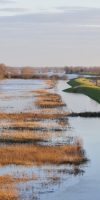Filter by:
News archive
-
Saint-Louis, caught between two threats
Deltares is working on two projects in Saint-Louis, Senegal, to protect the population against flooding from the Sénégal River and coastal erosion by the sea. “The problems are big, but we have collected a lot of data to arrive at the best solutions,” says Pieter Koen Tonnon, senior advisor at Deltares. Saint-Louis is caught between two threats. The coastal town in northern Senegal is located on a sand spit at the mouth of the Sénégal River, where high river levels cause flooding during the wet season. At the same time, the city borders on the sea, which means that storms and waves also cause flooding and coastal erosion on the narrow, vulnerable coast where many people live. 
Towards an effective approach for foundation problems: knowledge agenda in view
In recent years, there has been a sharp rise in awareness of foundation problems in the Netherlands, with the drought of recent years playing an important role. Although a lot is already known about the problems relating to foundations and how to tackle them, at the same time there is still a lot to learn. A new report from TNO and Deltares commissioned by the Netherlands Enterprise Agency (RVO) and the Ministry of Internal Affairs, 'Towards a knowledge agenda for foundation problems', explains the scope and nature of the problem in the Netherlands and gives an initial outline of a knowledge agenda for an effective approach to the problem.
Results from ten years of Sand Motor at Kijkduin promising
The evaluation of ten years of the Sand Motor shows that the innovative Sand Motor pilot is a success. The peninsula made of 21.5 million cubic metres of sand was created in 2011 on the coast near Kijkduin using the Building with Nature principle. The aim of the pilot project was to determine whether the wind and currents would spread the sand along the coast and towards the dunes, strengthening the coast in the long term and creating a dynamic nature and leisure area. That goal has been achieved. The evaluation shows that the coast is wider, that the dunes are growing well and that leisure visitors appreciate the area. The Sand Motor is also contributing to knowledge development about coastal management and maintenance, and inspiring other coastal protection projects worldwide.
Flood risk underestimated, particularly in the tropics
Deltares has applied a new dataset and found that coastal zones in much of the world are lower than has been realised. Flood risks are therefore higher, particularly given sea level rise and land subsidence.
More people exposed to low-probability coastal flooding than previously expected
Accounting for tropical cyclones more than doubles the global population exposed to low-probability coastal flooding. This is according to a new study from Deltares, the Institute for Environmental Studies (IVM) at VU Amsterdam and the Netherlands eScience Center, that simulated extreme sea levels that are caused by tropical and extratropical cyclones at global scale.-
New maps of foundation risk at neighbourhood level in the Climate Impact Atlas
Low groundwater levels caused by drought and land subsidence may result in damage to foundations. New maps in the Climate Impact Atlas now provide a clearer picture of the local risk of damage to wooden pile foundations (pile rot) and the differential settlement of buildings on steel foundations. -
An acceleration of coastal overtopping around the world
-
Updated land subsidence maps show the effects of climate change and water level management
Nine million Dutch people live or work in areas where the land is subsiding. The extent of subsidence in the future depends mainly on the amount of gas and salt extraction, how much the climate warms up and on the water level policy in place. The new maps in the Climate Effect Atlas for forecasting land subsidence provide an insight into the extent of subsidence in the Netherlands until 2100. Water level policy - fixing the water level as opposed to indexing it - and climate change have been included in a high and a low scenario. 
Deltares helps Seychelles with National Climate Plan
The Seychelles archipelago in the Indian Ocean near Africa includes 115 islands, less than a third of which are inhabited. The country is ranked high on the development index for this continent but income inequality is also relatively high. Like many small islands, the Seychelles are vulnerable to the effects of climate change.
Coastal retreat as a serious option to adapt to sea-level rise
Sea-level rise is expected to have severe consequences. To adapt to sea-level rise a range of options exists: protection, accommodation, coastal advance and retreat. So far, retreat has been mostly used post hoc, rather than preemptively. Researchers from Deltares, Utrecht University, New Zealand Climate Change Research Institute at Victoria University of Wellington, and Institute for Sustainable Development and International Relations demonstrate in the scientific journal Science how exploring pathways to managed retreat adds value in the context of the accelerating and long-term commitment to SLR. They argue that there is an urgent need to keep coastal retreat on the table as an option to adapt to sea-level rise.-
COASTAR project publishes potential of the subsurface in The Netherlands to prepare for drought
As of today, COASTAR will provide us with a picture of the opportunities afforded by the subsurface in the Netherlands to make better preparations for drought. After several years of drought, fresh water supplies in the Netherlands were under considerable pressure due to falling groundwater levels. -
Strategic Agenda ’22-’25
‘Enabling Delta Life’ is what Deltares stands for as an independent knowledge institute. We apply our high-quality knowledge to facilitate innovative and sustainable solutions to global issues concerning the use and risks of water and the subsurface. You can read how we intend to achieve this in the coming years in our Strategic Agenda 2022-2025.
